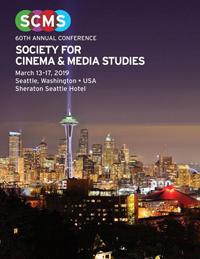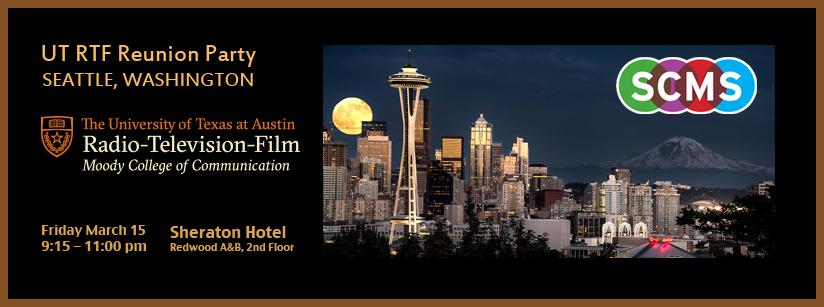2019 SCMS Conference

For film, television, and media scholars, the annual conference hosted by the Society for Cinema and Media Studies (SCMS) is one of the biggest scholarly events of the year. This year in Seattle, RTF faculty, students and alumni will present their latest research, engage in critical dialogues on media studies topics, and network with regarded cinema and media scholars from around the world. Many of those scholars are listed below.
We are thrilled to announce that Sue Murray (Ph.D. '99) won the 2019 SCMS Katherine Singer Kovács Book Award for Bright Signals: A History of Color Television (Duke University Press, 2018). Murray is Associate Professor of Media, Culture, and Communication at New York University, and also the author of Hitch Your Antenna to the Stars: Early Television and Broadcast Stardom, and the coeditor of Reality TV: Remaking Television Culture.
UT RTF Scholars Participating in 2019 SCMS Conference (partial list)
Faculty
Joseph Straubhaar
- B3: Netflix: The New Transnational Television Frontier
- “A Multicultural Approach to Quality TV in Times of Netflix. Exploring Brazil and Spain”
Kathy Fuller-Seeley
- C2: Negotiating Prestige and Spectacle: Historical Studies on Film Exhibition, Venues, and Spatiality
Curran Nault
- D4: Subversive Media Embodiments
- “The Spectre of Filipinx Femmepire: Call Her Ganda and the Activist Afterlife of Jennifer Laude”
Caroline Frick
- G9: The Politics and Perils of Professionalization: Analyzing Creative Labor Across Media Institutions
- “Have the Lunatics Taken over the Asylum? The Rise of the Media Preservation Professional”
Mary Beltrán
- M4: Tapping Into and Creating a New Politics of Televisual Latinidad: Strategies, Aesthetics, and Activism
- “Tanya Saracho’s Vida and Queer Latinidad as Marker of Quality”
Alisa Perren
- M10: Workshop: The Undergraduate Media Studies Curriculum in the 21st Century
Janet Staiger
- N16: Intoxicated Spectatorship
- “2001 as the Ultimate Trip: Exposing Altered Spectatorship”
Madhavi Mallapragada
- Q5: Roundtable: Rethinking Studies of Race, Media and Culture
- “Model Minorities, Capitalism and U.S. Media Industries”
Suzanne Scott
- T20: Pros and Cons: Fandom and Industry Promotion at San Diego Comic-Con
- “Not All Fanboys: Comic-Con 2018’s #MeToo Moment and the Structuring Absence of Chris Hardwick”
Students
Eric Forthun
- A19: Negotiating Risk: Women in Media
- “Women on Late-Night: Representation, Experimentation, and Industrial Risk”
Samantha Herndon
- B20: Emerging Trends in Exhibition and Distribution
- “Celluloid and tech giants: On gentrification and Seattle's changing cinema landscape”
Kate Cronin
- C14: Alternative Archives: Politics and Pedagogy
- “‘If They Won’t Let Us Dream, We Won’t Let Them Sleep’: Audiovisual Human Rights Archives in Chile”
Ashlynn d’Harcourt
- D3: Bodies and Genders on Television
- “The New New Normal: How the Comedians of ‘Take My Wife’ Normalize Otherness”
Caitlin McClune
- D14: Digital Technologies: Personal Computers to AI
- “The Sanctity of Sharded Beings: Cyborg Rights, Labor, and Machine Learning in Cultural Texts”
Brett Siegel
- D17: Fans and Audiences Across Media
- “Fantasy Sports Paratexts and the Structured Silence Surrounding Domestic Violence”
Nick Bestor
- F2: Gaming On and Beyond Screens
- “Post-Licensing: The Digital and Analog After-Life of Warhammer 40,000: Conquest”
Nathan Rossi
- G7: The Intersection Will be Televised
- “Rethinking Mixed Race Families: Transracial adoption in NBC's This is Us and HBO's Here and Now”
Selena Dickey
- H7: Hidden TV Histories
- “Complicating Television Distribution History: VHF Booster Stations and the Local Fight for National Television”
Jaqueline Johnson
- I7: Racial Engagements in 2010s Small-Screen Fictions
- “‘Cool Cool Cool’: The Multiracial Family and White Racism in Brooklyn Nine-Nine”
Ramna Walia
- I10: Records and Cassettes, Colonialism and Migration: Infrastructures and Material Networks of South-South Media Flows
- “Imaginary Travels: Dubai and the ‘Sensory Infrastructures’ of local Malegaon video Productions”
Morgan O’Brien
- J9: Hierarchies of Connectivity in Video Games
- “Exploring space(s) in Tacoma: how acousmatic sound and vision in digital games create altergeographies”
Nabeeha Chaudhary
- J18: Asian American Media from the Production Code to K-Pop
- “Women, Agency and Migration: The Pakistan Portrayed in ‘Jackson Heights’”
Paul Monticone
- L5: Death, Lawyers, and Taxes: New Approaches to U.S. Film History
- “‘Like A Dog in the Manger’: The MPPDA, David O. Selznick, and Intellectual Property Self-Regulation”
Kyle Wrather
- N12: Streaming Video Beyond Netflix: Broadcasting and Narrowcasting in the Streaming Era
- “Eyes on the Ball: Tennis Channel Plus and the Premium Sports Streaming Racket”
Daelena Tinnin
- P5: Blackness in Popular Film
- “Whither the Gender of Get Out: A Critique of the Cinematic (Im) Possibilities of Black Female Subjectivity”
Jinsook Kim
- P8: Interrogating #MeToo in Asia: Media Activism and Social Backlash in South Korea and China
- “Doubtful Anonymity? Questions of Visibility, Authenticity, and Accountability Regarding #MeToo in South Korea”
Mengmeng Liu
- P8: Interrogating #MeToo in Asia: Media Activism and Social Backlash in South Korea and China
- “#MeToo in China: A Struggle with Censorship”
Chantaelle Moffett
- P11: Power and Politics in Fandom
- “I Am Not Your Hero: Ecological Conflict, Cultural Literacy, and Redefined Marginality in Black Panther Fandom”
Lesley Willard
- P11: Power and Politics in Fandom
- “Watchers on the Wall: Surveillance, Spoiler Culture, and the Fanopticon”
Jacqueline Pinkowitz
- P17: Saving Whiteness: Reactionary Masculinities, Spectacular Violence, and the Politics of White Supremacist Patriarchy
- “Rape, Reactionary Violence, and the Defense of Whiteness (Supremacy) in Civil Rights Exploitation Films”
Briana Barner
- P19: The Podcast “Chitlin’ Circuit”: Black Podcasters and Cultural Specificity
- “What Is This ‘Black’ in Black Podcasting: Blackness, Identity, and Marginalization Within Podcasts”
Katharine Cacace
- P19: The Podcast “Chitlin’ Circuit”: Black Podcasters and Cultural Specificity
- “Black True Crime Podcasts: Investigating the Racialized Norms of a Genre”
Gejun Huang
- Q3: Do What Xi Says? ; Responses of Chinese Film and Gaming Industries to Xi Jinping Era Media Regulation
- “A Small Fish in a Big Pond: Understanding Entrepreneurship in Chinese Game Industry”
Anne Major
- R17: Streaming Beyond Netflix and YouTube: Production, Distribution, and Consumption in the On-Demand Era
- “Curation and Rotation: Recirculating Library Films in the Streaming Marketplace”
Timothy Piper
- T4: Sports TV: On Air and On Line
- “Seattle’s SuperChannel: Regional Subscription Services and the Value of Linear Sports Content”
Rusty Hatchell
- T7: Franchises
- “Marvel’s Runaways: Localizing Authenticity in Superhero Television”
Margaret Steinhauer
- T15: TV and New Media
- “Social TV as Flow: Audiences and the ‘(Super)Text’ in the Post-Network Era”
Lauren Wilks
- U8: The Bachelor
- “One Nation, Under Chris Harrison: The Bachelor's Relationship with Blackness”
Party
Please join the UT Austin Department of Radio-Television-Film for our seventh annual "Back to the Ranch" SCMS Reunion Party” with graduate students, alumni, faculty and friends. Catch up and enjoy some light refreshments.
Hook 'em!
WHEN: Friday, March 15, 9:15 pm – 11:00 pm
WHERE: Sheraton Hotel - Redwood A&B, 2nd Floor
RSVP: https://www.eventbrite.com/e/ut-radio-television-film-back-to-the-ranch-reunion-party-scms-2019-tickets-56935467516
QUESTIONS: kathy.fullerseeley@austin.utexas.edu


